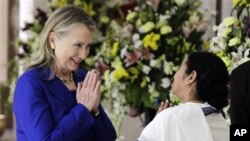U.S. Secretary of State Hillary Clinton is in the Indian capital, where she is scheduled to meet the country's highest officials. Clinton is pressing energy-starved India to continue weaning itself off oil imports from Iran.
Before arriving in the Indian capital Monday, Secretary Clinton met in Kolkata with one of India's most influential regional officials - West Bengal Chief Minister Mamata Banerjee.
It was her first major meeting since arriving in India from Bangladesh - but Banerjee says two widely anticipated topics were not on the agenda.
In response to a reporter's question, Banerjee says she and Clinton did not discuss the issue of foreign direct investment or a stalled agreement to share water from the Teesta river along the West Bengal/Bangladesh border.
Last year, an Indian government order would have permitted foreign ownership stakes in multi-brand retail operations in major cities. It would have effectively allowed American corporate giants like Wal-mart to control supply chains for food and agriculture. Banerjee opposed the order, and forced the government to roll it back by threatening to withdraw her party from the ruling coalition.
Prior to the Banerjee meeting, Clinton indicated in a televised town hall discussion that she was likely to raise the issue of foreign direct investment. "There is an enormous amount of experience that can be brought to India on supply chain management, on developing relationships with small producers so that production will be in larger quantity, and there can be all kinds of assistance with farmers on their agricultural production," she said. "So I think there are a lot of benefits that may not be necessarily immediately perceived."
India Finance Minister Pranab Mukherjee announced Monday India would be softening some controversial tax measures that had caused concern among international investors. It is unclear if the timing of the announcement is in any way linked to Clinton's visit.
In New Delhi, Clinton is scheduled to visit with Prime Minister Manmohan Singh and Congress Party President Sonia Gandhi. She also plans to meet her Indian counterpart, S.M. Krishna, to set the stage for a U.S. - India strategic forum scheduled in Washington next month.
The issue of Indian oil imports from Iran is also expected to be high on Clinton's meeting agenda. The United States and Europe have placed sanctions against Teheran to discourage what they believe is a nuclear weapons program.
India does not back the sanctions, and is actually seeking to boost non-oil trade with Iran. Still, Clinton acknowledged India's efforts to quietly reduce Iranian fuel imports, and she is expected to urge Indian leaders to do even more. "We appreciate what has been done and of course, we want to keep the pressure on Iran so whatever India or other countries can do, will help us achieve that," she stated.
Meanwhile, Clinton confirmed Monday that she had personally authorized a $10-million bounty for information leading to the arrest and prosecution of suspected Pakistani terrorist Hafiz Saeed. Saeed is accused of a major role in planning the November 2011 terror attacks in Mumbai which killed 166 people. There has been some confusion about the bounty since last month, when Washington's ambassador to Pakistan insisted the United States was not offering it.
Clinton also said Monday that she believes al-Qaida leader Ayman al-Zawahiri is located in Pakistan. In Islamabad, Foreign Minister Hina Rabbani Khar told reporters that if Washington has evidence of his presence, then it should be provided to Pakistan because al-Qaida is an enemy of both countries.
US Secretary of State Meets Key Regional Figure In Indian Politics




